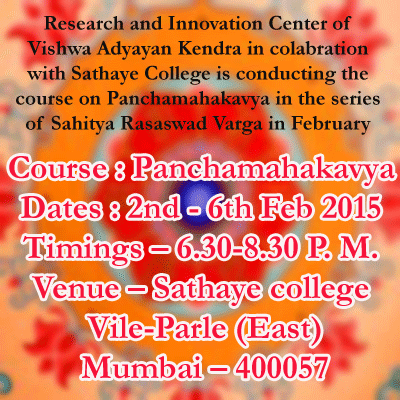Report on First Lakshmanrao Bhide Memorial Lecture
11th January 2007 - Mumbai
The relentless pursuit of economist approaches has some adverse effects on people. The economist approach, in the long run, tends to result in the emergence of 'one dimensional societies' wherein every aspect of human life is transactionalised.
Materialism has a great effect on individuals, their families, economic systems and the environment. Materialism may increase a society's economic wealth and material possessions but it also creates the never ending quest for more material possession that is harming the environment.
Besides the feeling of alienation, this approach also creates several other negative consequences for the psychological health of people. In modern societies, a greater number of people suffer from diseases of the soul than of the body.
Hindu approach believes that socio-cultural factors also play an important role in economic growth. When people do not cherish and uphold spiritual and universal values, they become incapable of possessing national character, integrity, self-discipline and sense of duty and indulge in unethical behaviour. This approach in India, bases its premise on the concept of four Purusharthas, i.e., four-fold achievements of human life. These four purusharthas are:
- DHARMA i.e. virtue/ethical merit
- ARTHA i.e. wealth,
- KAMA i.e. pleasure/enjoyment,
- MOKSHA i.e. self-perfection/salvation.
Hindu approach believes that a human being is capable of revolutionizing the inner self of an individual by convincing him/her that the material and the non-material are the two faces of the same coin and the lopsided emphasis on the material aspect would create imbalance in the individual as well as social life. The highest aim is the common good, which can be achieved through Hindu way of life. The supreme goal of humanity is the welfare, progress, and happiness of the entire human race, irrespective of nation, race, sex, or economic status. This of course implies the complete abolition of nationalist and racial prejudice. Hinduism has a compassionate concern for all fellow human beings.
The thought-provoking lecture was a real intellectual feast and the audience was spell bound by the same and listened in rapt attention. The over 450 + audience represented a wide range of professionals and as much as 150 were hearing Shri Sudarshanji for the first time.
Dr Ajit Phadke delivered the presidential address and enlisted the various achievements of the Hindu society worldwide especially in the last decade. He also reminded that the achievements would get recognition only if the society disciplined and united. He recalled the yeoman service of Late Lakshmanrao Bhide in uniting the Hindu society overseas by his tireless visits. He appealed that many more selfless personalities like Lakshmanrao Bhide are needed to fill the dire needs of today.
Shri Ratan Sharda, Secretary of VAK, conducted the whole proceedings of the evening proposed that vote of thanks and also informed the gathering about the proposed Lakshmanrao Bhide Fellowship for the study of the PIOs.
Among the many memorable moments of that evening was the beautiful rendering of the song sakal jagat kaa mangal karne tribhuvan mein hum prem bharein and ekata mantra by Sow Manjari Gokhale.
